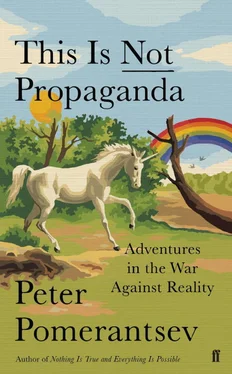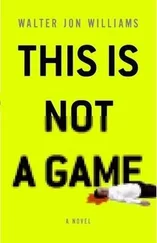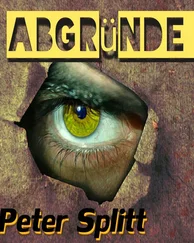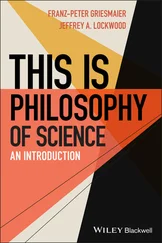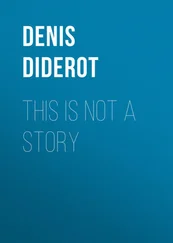In 1983 BBC Monitoring noticed something most unusual: a presenter on Radio Moscow’s English Service began to call Soviet soldiers who had invaded Afghanistan ‘occupiers’ rather than the official ‘limited contingent’ of ‘internationalist warriors’ bringing help to the ‘fraternal people of Afghanistan’. [17] What the presenter, a previously unassuming man called Vladimir Danchev, was doing was unheard of. He was quickly suspended from Radio Moscow and sent to a psychiatric ward in Uzbekistan. After the Soviet Union fell, he admitted he made the first reference to ‘occupiers’ by accident, but once he started he just couldn’t stop himself from saying what he really thought.
Danchev’s personal radio rebellion was a crack in the Soviet firmament of pseudo-facts. Soon Soviet listeners would be turning to the BBC in order to survive.
Like a transistor radio, a Geiger counter is also attuned to pick up invisible signals pulsating through the atmosphere. It measures radioactive emissions – gamma rays and particles – and when they increase the Geiger counter starts to make a clicking, ripping sound. On 26 April 1986 the Geiger counters of Scandinavian scientists, both professional and amateur, began to rattle hysterically: a radiation cloud of historic magnitude was moving towards Europe from Soviet Ukraine. The Soviet state media gave one brief account of a minor accident at a nuclear reactor in Chernobyl, near Kiev. And then silence.
In Moscow and Kiev the May Day parades, with their vast columns of soldiers and warheads symbolising Soviet might, went on as normal. But while the Soviet media were silent, the BBC and other Western ‘voices’ began reporting on the radiation levels immediately. In Kiev rumours were quickly rife that the Communist Party elite were evacuating their children from the city. A pilot, so the story went, had been commissioned to fly out a whole planeload of nomenklatura brats, but had grounded the plane out of disgust at the injustice.
In the absence of official health guidelines, folksy medical advice spread like a plague through the city. ‘Drink lots of sweet red wine,’ went one piece of advice. Everyone ran out to get drunk. Then came the counter-advice: ‘Sweet red wine will make radiation poisoning worse!’
Throughout all this the BBC was giving regular bulletins on the greatest radiation catastrophe in history, with scientists commenting on the spread of the radiation cloud and medical experts giving advice on radiation poisoning. Tuning in became necessary for sanity and survival. It would take another two weeks before the Soviet media made any official announcement. By then any remaining faith in them was shot: you couldn’t trust them to tell you what was in your milk, your meat, your bread, your water.
In 1987 the new general secretary of the Soviet Union, Mikhail Gorbachev, admitted that the lack of truth surrounding Chernobyl had been a disaster. [18] He promised to give new freedom to Soviet media. He removed restrictions on foreign books, films, video cassettes, on access to historical records and to Chernobyl itself. He called the politics ‘glasnost’ – literally ‘giving voice’. It had been initiated in 1986, but it was only after Chernobyl that it began to be enacted in earnest. ‘Glasnost’ had been a term used by dissidents to demand more information about political trials; now it was the language of Soviet policy.
In 1988 the Soviet Union ceased jamming the BBC. At the World Service this was met with jubilation. Could the regime that seemed immortal, permanent, immovable actually be changing? Could Russia, Ukraine become something else?
For Igor it felt like the artist, activist and journalist in him were flowing into one: freedom to access information and creative freedom; individual rights and the right to be utterly individualistic. In much of his writing from the 1980s current affairs were conspicuous by their absence, but were latent in everything he wrote in its celebration of liberation from constraint. He wrote in stream-of-consciousness swirls of pure impressionism, breaking the borders between realism and fantasy, poetry and prose. He recreated Bush House as populated by hedgehogs and foxes gripped by panic as a sticky blue fog bursts the windows on every floor and each animal wonders, ‘Who will be next?’ – though the exact consequence of being next is never quite defined. He reinvented himself as a boy who wakes up with a fever, takes a thermometer and places it in his armpit, only to discover his armpit is now an abyss as he falls into it. He travelled to Ticino to cross the Italian border with Switzerland, hither and thither, over and over, revelling in the freedom to cross all barriers. In one of his poems he had written, ‘If I were a red Indian, my nickname would be Barrier-Crosser.’ Now all the barriers were coming down.
That year Prime Minister Margaret Thatcher, wearing a checked jacket and pearl necklace, strode into Bush House and conducted a live phone-in with Soviet listeners on the Russian Service. Nothing of the kind had been attempted previously. [19] Soviet citizens rarely got to talk to their own leaders, let alone engage one – and a woman too! – in live conversation. To a question from Kaunas, Lithuania, about whether the changes in the Soviet Union (glasnost, as well as the political and economic reforms known as perestroika) were reversible if someone other than Gorbachev took charge, Thatcher answered:
‘I think that once you have tasted the increasing freedom of speech and discussion, the liveliness of debate that you are having now, then I think that it would be very difficult to reverse that.
‘But I do not think that they would go forward with anything like the same momentum if Mr Gorbachev were not there. I recognise someone who has a vision for the future.
‘In a way, I felt like that myself when I became prime minister of my country.’ [20]
At the end of the programme Thatcher was apparently heard to say, ‘Oh, was that all? We could have done with more time on air.’ There was a small drinks party with the Service staff. Thatcher had her usual whisky.
During glasnost, it seemed like the truth would set everybody free. Dictators appeared so afraid of the truth they had it suppressed. But something drastic has gone wrong. We have access to more information and evidence than ever, but facts seem to have lost their power. There is nothing new in politicians lying, but what seems novel is that they seem to be making a thing out of showing that they don’t care about whether they tell the truth or not.
When Vladimir Putin went on international television during his army’s annexation of Crimea and asserted, with a smirk, that there were no Russian soldiers in Crimea, when everyone knew there were, and later, just as casually, admitted that they had been there, he wasn’t so much lying in the sense of trying to replace one reality with another as saying that facts don’t matter. Similarly the president of the United States, Donald Trump, is famous for having no discernible notion of what truth or facts are, yet this has in no way been a barrier to his success. According to the fact-checking agency PolitiFact, 76 per cent of his statements in the 2016 presidential election were ‘mostly false’ or down-right untrue, compared to 27 per cent for his rival. [1]He still won.
Why has this happened? Is technology to blame? The media? And what are the consequences in a world where the powerful are no longer afraid of facts? Does that mean one can commit crimes in full view of all? And then just shrug them off?
Читать дальше
